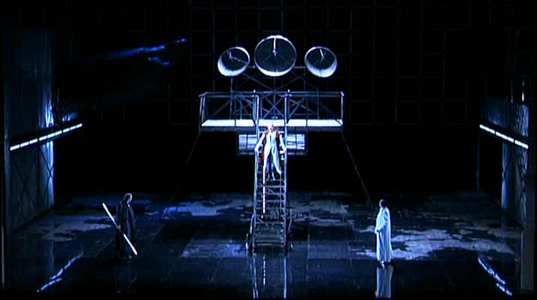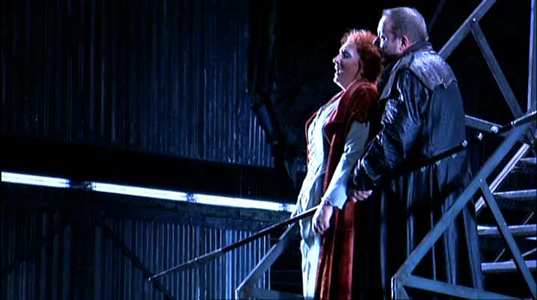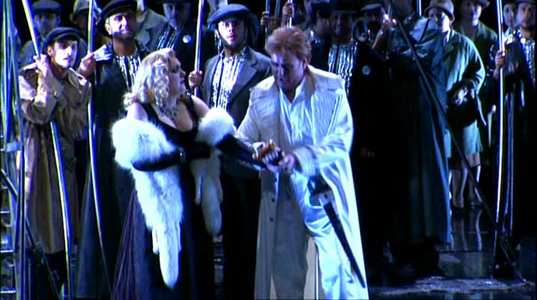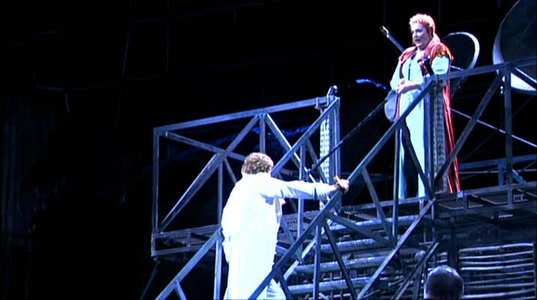Wagner: Götterdämmerung (de Billy)
Introduction
The final part of Wagner`s epic cycle of music dramas, consisting of a prologue and three acts, staged at Barcelona in 2004.
The Prologue begins with the three Norns (personifications of the past, present and future), weaving their ropes (symbolic of fate) and prophesising dire things for the humans and Gods we have met previously.
Siegfried and Brünnhilde are now together, madly in love and living together on the rock to which Brünnhilde was banished in Die Walküre. Being a hero, Siegfried cannot stay still for long and departs to perform the deeds for which heroes are known. He comes across the domain of Günther, who lives with his sister Gutrune, and `protector` Hagen (son of Alberich, the dwarf).
Hagen has long held a desire to kill Siegfried and claim the Rheingold for himself (the treasure his father stole at the beginning of the saga) and hatches a plot to get Siegfried to forget Brünnhilde and marry Gutrune, while Günther can hitch up with Brünnhilde. He gives Siegfried a potion which makes him forget his first bride and fall in love with Gutrune, and then persuades him to wear the Tarnhelm (a helmet that makes you appear as someone else) and walk through the fire around Brünnhilde`s rock pretending he`s Günther. In this disguise, he steals the Ring from Brünnhilde, and claims her as `Günther`s` bride.
Brünnhilde is naturally annoyed by this development, and when she is brought back to Günther`s house, she realises what has happened and vows to have her revenge, revealing to Hagen that Siegfried is vulnerable to attack from behind, being protected by her own magic everywhere else.
The men go on a hunt, and Hagen takes the chance to plunge his spear into Siegfried`s back. Siegfried dies, but not before coming to his senses and realising what he has done to Brünnhilde.
When his body is returned, Brünnhilde realises she has been tricked and that Siegfried was innocent all along, and reverting to her status as a Valkyrie, claims the ring and throws herself onto Siegfried`s funeral pyre to cleanse the curse and be with her husband.
The Rhein floods, Valhalla is destroyed, and humans are left to forge their own destinies.
..and that`s the short summary!

Video
In common with the rest of the cycle, the performance is presented in a region free 16:9 anamorphic transfer and NTSC format, and overall, the video quality is ok, although the stage lighting produces a nasty glare we have seen before in this theatre. Again, there is some very visible camera shake, and at times, focussing problems make it seem as if it`s a very amateurish affair.

Audio
As usual, the audio is LPCS stereo or DTS, but yet again, we have to suffer the stage microphones, which miss many of the vocal climaxes and allow the orchestra to drown out the singers. The orchestra pit itself appears to have microphones dotted around the place, which isn`t unusual, but causes some very odd balance problems, bringing out certain instruments you don`t particularly need, or indeed want to hear at certain points.

Features
Extras include an illustrated synopsis and cast gallery. The latter is nothing special - just pictures of the cast, and their names against the characters they play. Some form of biography for each would have been nice. Subtitles are in English, French, German, Spanish, Catalan and Italian, and the disc also includes a booklet which contains a short essay on the production in English, French, German and Spanish.

Conclusion
And so we reach the final curtain.
It`s been fascinating watching the last three parts of the cycle in relatively quick succession, as you can gain some sense of continuity as the story progresses.
The production, yet again, is very good, and employs some great stage effects, which can possibly make you forget about some of the other issues that pop up. The most noticeable of these, for me at least, was that Günther is sung by Falk Struckmann, who has sung the part of Wotan in the other three operas. I`m sure this isn`t the norm (although if I`m wrong, please let me know). I have no idea why this is, as there isn`t much dramatic sense in it, and the music for the two characters almost certainly demands a different voice.
Having said this, Struckmann carries it off with great bravado, and it`s good to see him in a slightly more `jovial` part (earlier on anyway). Funnily enough, `Wotan` appears just after Siegfried`s death but I think it`s just a stand-in as we don`t see his face. Another bit of dramatic licence I think.
And again, John Treleaven (Siegfried) is the weak link. Despite giving it his all towards his death (some fine singing - momentarily), the depth of voice just isn`t there, and quite often, neither are the notes, which are swallowed up in come quite unncessary warbling and noticeable straining. It`s a killer of a role, but one that should only really be attempted by someone with the vocal stamina that can carry it off. Treleaven`s characterisation is incredibly good indeed, but without the voice, Siegfried just appeared to be a fraud.
Matti Salminen (Hagen) has the perfect voice and presence for such a disgusting character (nothing personal Matti!). He manages to delve the depths like very few can, is particularly moving in `Hier sitz` ich zur Wacht` and produces a shattering performance overall.
Deborah Polaski (Brünnhilde) gives a wonderful performance (certainly her best of the cycle), and despite the irritations I have with the sound, manages to send the right shivers down the right part of the spine, and make you feel for her character as she moves towards her self-destruction. I have rarely agreed more with an audience when she came on to take a bow.
The Rheinmaidens appear damp and bedraggled, perhaps unsurprisingly, and have their good moments, but other moments needed a little pumping up to hit the notes that were actually written for them.
Elisabete Matos (Gutrune) makes a lovely sound, and came across as possibly the most rounded singer of the cast on the night. Her character is treated appallingly and we definitely feel that she deserves considerably better than what is offered to her. This is Wagner though, and not many women end up happy is his world.
The orchestra suffers from its usual scrappiness in some places (most noticeably the quiet entries) and what seems to be sudden switching in the microphone bias can leave some bewildered violin passages dying to be taken back to the correct volume and perhaps not heard so well. There are though, some brilliantly played sections which shows that they can do their stuff when they want.
Bertrand de Billy obviously enjoys this one, as he whips the music up into several frenzies but sometimes appears to forget that a little bit of give and take can work wonders. As it is, I was left rather underwhelmed by his interpretation of some of the most beautiful and inspirational music ever written.
And so to bed, for this cycle at least. I think it could well be quite a popular buy amongst Wagnerians (the Teutonic equivalent of Trekkies), as the production is well known, and much of the singing is rather good, but until we get the Barenboim Ring Cycle from Bayreuth on DVD (hopelessy overdue!), I`m not sure there`s a Ring that really stands out as the benchmark performance.
Your Opinions and Comments
Be the first to post a comment!